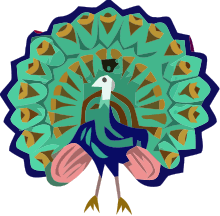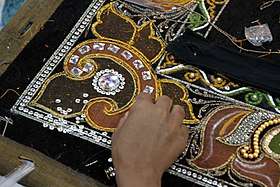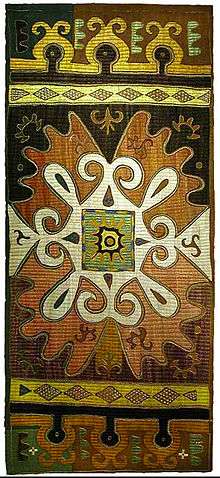Kalaga
Kalaga (Burmese: ကန့်လန့်ကာ) is a heavily embroidered appliqué tapestry made of silk, flannel, felt, wool and lace against a background made of cotton or velvet indigenous to Burma (Myanmar).[1] The word kalaga, which means "curtain," comes from the Burmese language, although Burmese refer to such tapestries as shwe gyi do (ရွှေချည်ထိုး; lit. 'gold thread embroidery').[2] These tapestries use a sewing technique called shwe gyi (ရွှေချည်)[3]
| Part of a series on the |
| Culture of Myanmar |
|---|
 |
| People |
|
Mythology and folklore |
|
Cuisine
|
|
Literature
|
|
Media |
|
Monuments
|
|
Organisations
|

This artform emerged during the Konbaung dynasty in the mid-19th century and reached its zenith during the reign of Mindon Min, when velvet became fashionable at the royal court.[4]
In a typical tapestry, padded figures are cut from various types of cloth and sewn onto a background, usually red or black cloth to form an elaborate scene, traditionally from Burmese classical plays (e.g. Ramayana, Jataka).[1][5][6] The figures are sewn using a combination of metallic and plain threads and adorned with sequins, beads and glass stones.[6]
See also
References
- Mukharji, T. N. (1888). Art-manufactures of India. Superintendent of Government Printing, India. pp. 387–388.
- "Journal of Burma Studies - Volume 16.1". Northern Illinois University. Retrieved 6 October 2013.
- Fraser-Lu, Sylvia (1994). Burmese Crafts: Past and Present. Oxford University Press. p. 265. ISBN 9780195886085.
- Falconer, John; Luca Invernizzi (2000). Burmese Design and Architecture. Tuttle Publishing. pp. 194–195. ISBN 9789625938820.
- Leslie, Catherine Amoroso (2007). Needlework Through History. Greenwood Publishing Group. p. 121. ISBN 9780313335488.
- "More information about Burmese Kalagas". SiamTraders.com. 2001. Retrieved 6 October 2013.


